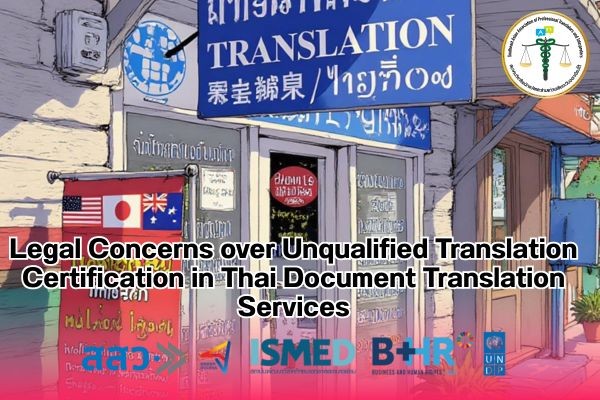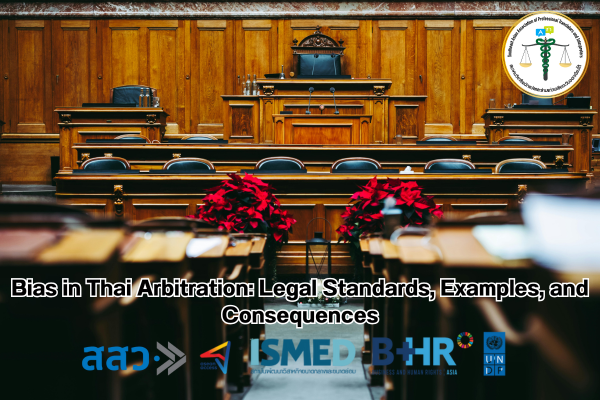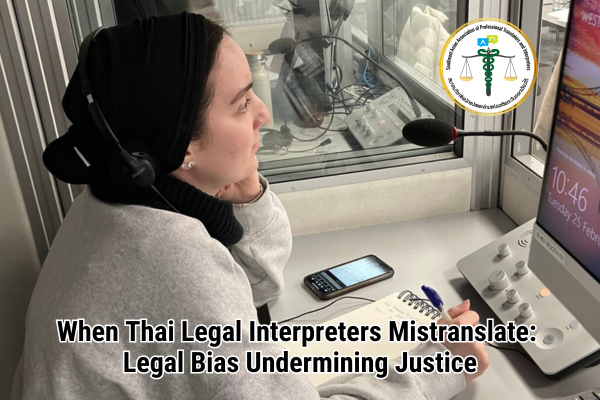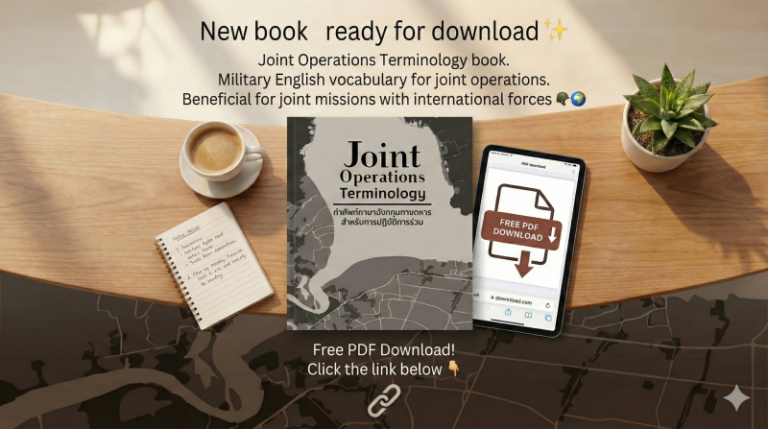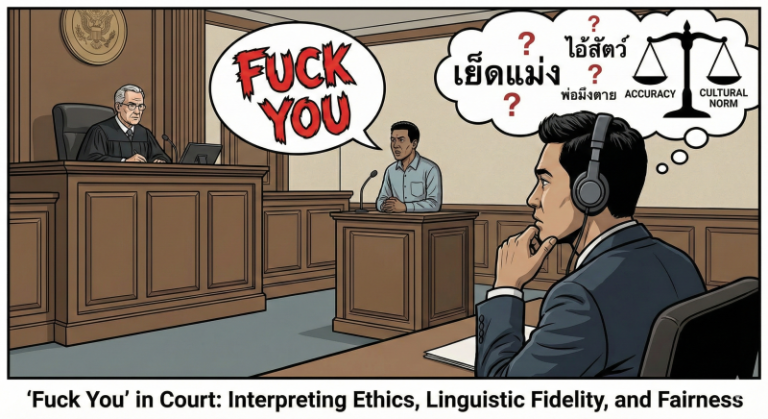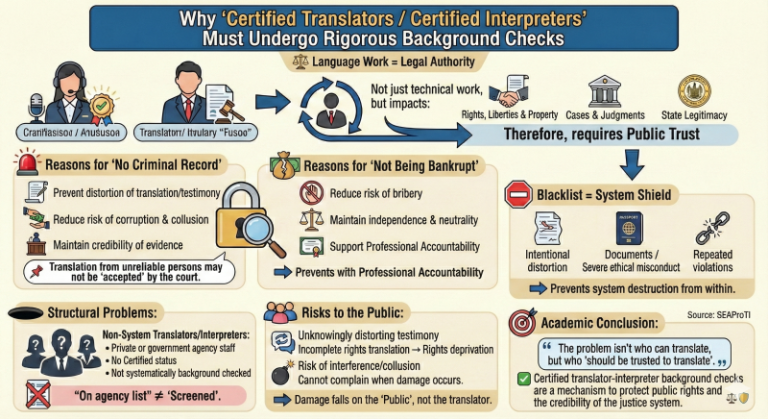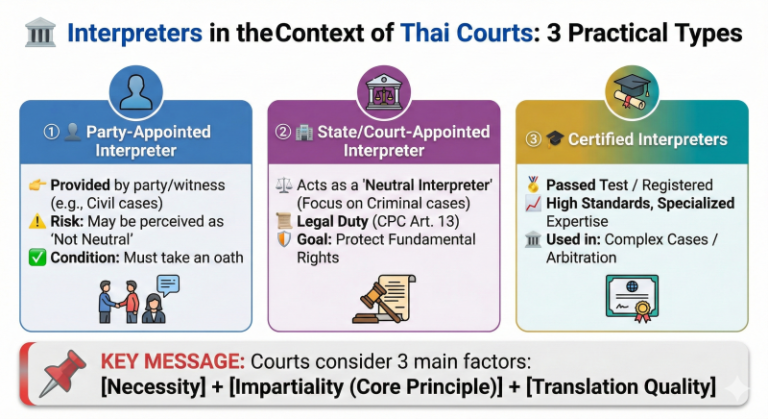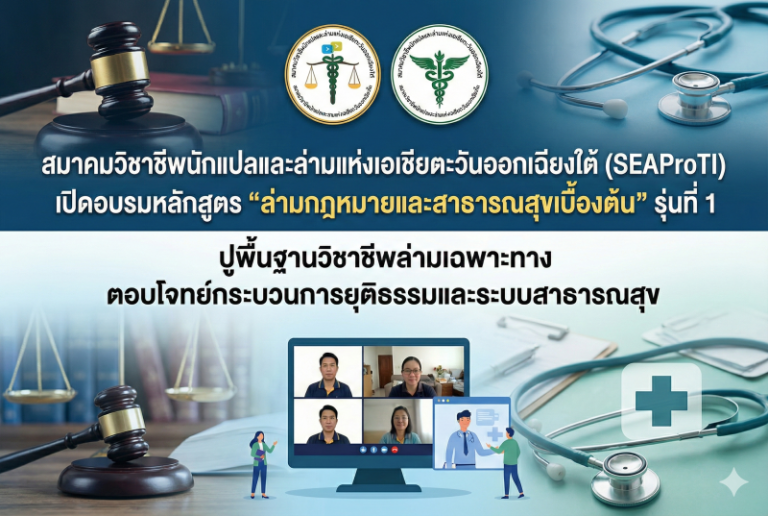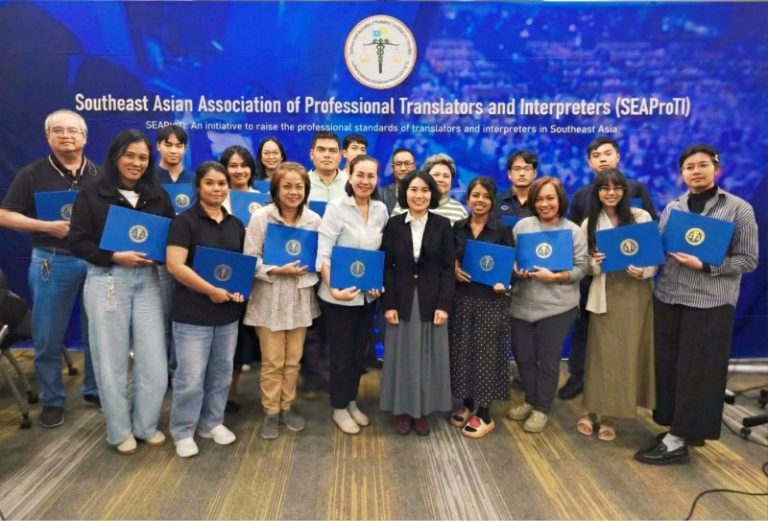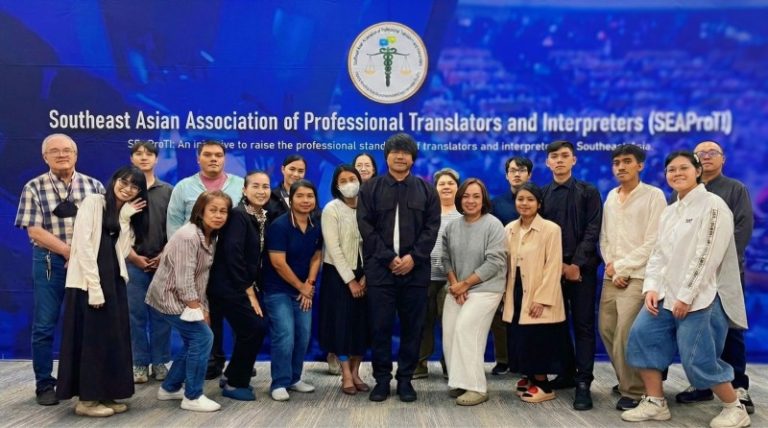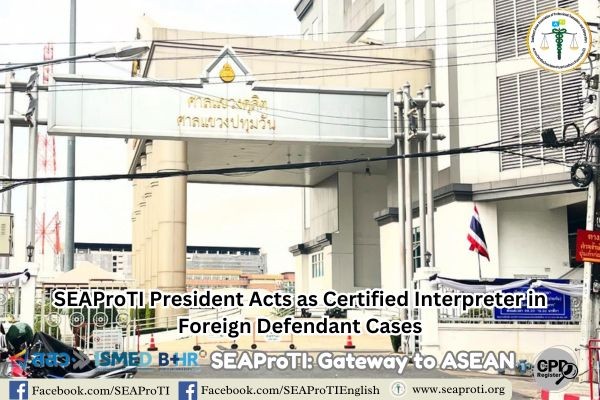Legal Concerns over Unqualified Translation Certification in Thai Document Translation Services
Abstract
7 July 2025, Bangkok – There is a growing concern regarding the legality of translation certifications issued by unauthorized individuals or organizations. In particular, several translation agencies, document service companies, and even law offices in Thailand have been found to issue translation certifications without meeting the legal qualifications required under Thai administrative law. This article examines the relevant legal frameworks—namely the Administrative Procedure Act B.E. 2539 (1996) and the Ministerial Regulation B.E. 2540 (1997)—and highlights the legal consequences of unauthorized practices. It also offers recommendations to ensure lawful and accountable translation certification processes.
1. Introduction
The translation and certification of official documents play a crucial role in both domestic administration and international legal processes. Proper certification ensures the authenticity and legal standing of documents used in government, court, immigration, and international affairs. However, it has come to light that many individuals and businesses in Thailand issue translation certifications without proper legal authority, rendering such documents invalid and potentially harmful to users and the public administration.
2. Relevant Legal Frameworks
2.1 Administrative Procedure Act B.E. 2539 (1996)
This Act governs the conduct of administrative procedures by Thai government agencies, emphasizing legality, transparency, and fairness. Accepting or relying on documents certified by unauthorized persons may violate these principles and compromise due process.
2.2 Ministerial Regulation B.E. 2540 (1997)
This regulation, issued under the Administrative Procedure Act, clearly defines who may legally certify translations for official purposes. Qualified individuals or entities must meet one of the following criteria:
- Thai nationals holding at least a bachelor’s degree, with instruction conducted in the foreign language in question;
- University lecturers in Thailand who teach the relevant foreign language;
- Foreign embassies or consulates based in Thailand;
- Thai embassies or consulates located abroad;
- Certified translators or certifying officers from recognized training institutions or language organizations that conduct structured assessments and maintain registration standards, such as SEAProTI according to the recommendations of the Office of the Council of State (2025)
Certified translators who have been accredited by professional organizations such as the Southeast Asian Association of Professional Translators and Interpreters (SEAProTI) typically meet these qualifications, having completed formal education and gained relevant professional or academic experience.
3. Legal Consequences of Unauthorized Certification
Engaging in translation certification without proper qualifications may lead to serious legal consequences:
- Rejection of Documents: Government agencies or consular authorities may refuse to accept uncertified or improperly certified translations.
- Criminal Liability: Issuing false or forged certification may constitute document fraud or misrepresentation under the Penal Code.
- Administrative Misconduct: Public officers who accept such documents without due diligence may violate Section 157 of the Thai Penal Code for dereliction of duty.
4. Policy and Practice Recommendations
- Verification is Essential: Government agencies and the public must verify that translation certifications are issued by qualified persons or organizations as required by law.
- Use of Certified Professionals: Translation companies and law firms should engage translators who have been properly trained, certified, and registered by credible professional bodies such as SEAProTI or by recognized state authorities.
- Public Awareness: Legal and administrative institutions should actively promote awareness of the relevant laws and regulations to help individuals and agencies avoid inadvertent violations.
5. Conclusion
Translation certification is not merely a technical task—it carries legal weight and must be performed under the supervision of those legally authorized to do so. Unauthorized certification undermines the integrity of administrative processes and exposes users to legal and procedural risks. To uphold the rule of law and promote public trust in official documentation, all stakeholders must ensure strict compliance with legal standards governing translation and certification in Thailand.
SEAProTI’s certified translators, translation certification providers, and certified interpreters:
The Southeast Asian Association of Professional Translators and Interpreters (SEAProTI) has officially announced the criteria and qualifications for individuals to register as “Certified Translators,” “Translation Certification Providers,” and “Certified Interpreters” under the association’s regulations. These guidelines are detailed in Sections 9 and 10 of the Royal Thai Government Gazette, issued by the Secretariat of the Cabinet under the Office of the Prime Minister of the Kingdom of Thailand, dated July 25, 2024, Volume 141, Part 66 Ng, Page 100.
To read the full publication, visit: the Royal Thai Government Gazette
ปัญหาทางกฎหมายเกี่ยวกับการรับรองคำแปลโดยผู้ไม่มีคุณสมบัติตามกฎหมายในร้านแปลเอกสารไทย
บทคัดย่อ
7 กรกฎาคม 2568, กรุงเทพมหานคร – ในปัจจุบัน ปรากฏข้อกังวลทางกฎหมายที่เกี่ยวข้องกับการรับรองคำแปลเอกสารราชการโดยบุคคลหรือองค์กรที่ไม่มีคุณสมบัติตามที่กฎหมายกำหนด โดยเฉพาะในกรณีของร้านแปลเอกสาร บริษัทแปล และสำนักงานกฎหมายบางแห่งที่ดำเนินการออกใบรับรองคำแปลโดยปราศจากอำนาจตามกฎหมาย บทความนี้มีวัตถุประสงค์เพื่อวิเคราะห์กฎหมายที่เกี่ยวข้อง ได้แก่ พระราชบัญญัติวิธีปฏิบัติราชการทางปกครอง พ.ศ. 2539 และกฎกระทรวง พ.ศ. 2540 ที่ออกตามความในพระราชบัญญัติดังกล่าว พร้อมทั้งชี้ให้เห็นถึงผลกระทบทางกฎหมายที่อาจเกิดขึ้นจากการกระทำโดยมิชอบ ตลอดจนเสนอแนวทางการปฏิบัติที่ถูกต้องตามกรอบกฎหมาย
1. บทนำ
การแปลและรับรองคำแปลเอกสารราชการเป็นกิจกรรมที่มีผลกระทบโดยตรงต่อสิทธิของประชาชนและความน่าเชื่อถือของกระบวนการทางปกครอง โดยเฉพาะอย่างยิ่งเมื่อเอกสารนั้นจะนำไปใช้ในกระบวนการทางราชการหรือในต่างประเทศ อย่างไรก็ตาม พบว่ามีการรับรองคำแปลโดยบุคคลที่ไม่มีคุณสมบัติตามกฎหมายจำนวนมาก ซึ่งอาจส่งผลให้เอกสารที่รับรองโดยบุคคลเหล่านั้นไม่ชอบด้วยกฎหมาย และอาจก่อให้เกิดความเสียหายแก่ผู้ใช้งาน รวมถึงหน่วยงานของรัฐที่รับเอกสารนั้นไว้ใช้อ้างอิง
2. กฎหมายที่เกี่ยวข้อง
2.1 พระราชบัญญัติวิธีปฏิบัติราชการทางปกครอง พ.ศ. 2539
กฎหมายฉบับนี้เป็นกรอบหลักในการกำกับดูแลการดำเนินการทางปกครองของหน่วยงานรัฐ โดยเน้นความโปร่งใส ความเป็นธรรม และการใช้ดุลพินิจภายใต้กรอบกฎหมายอย่างถูกต้อง การอ้างอิงหรือยอมรับเอกสารที่ไม่ได้ผ่านการรับรองจากผู้มีอำนาจโดยชอบ อาจเข้าข่ายเป็นการกระทำที่ขัดต่อหลักนิติธรรม
2.2 กฎกระทรวง พ.ศ. 2540
กฎกระทรวงฉบับนี้ออกตามพระราชบัญญัติฯ ข้างต้น และกำหนดอย่างชัดเจนถึงคุณสมบัติของบุคคลหรือองค์กรที่สามารถรับรองคำแปลเอกสารจากภาษาต่างประเทศเป็นภาษาไทยเพื่อใช้ในราชการ ได้แก่
- บุคคลสัญชาติไทยที่สำเร็จการศึกษาระดับปริญญาตรีขึ้นไป โดยที่ภาษาที่เรียนเป็นภาษาต่างประเทศนั้น
- อาจารย์ในสถาบันอุดมศึกษาในประเทศไทยที่สอนภาษาดังกล่าว
- สถานทูตหรือสถานกงสุลของประเทศเจ้าของภาษาในประเทศไทย
- สถานเอกอัครราชทูตหรือสถานกงสุลของไทยในต่างประเทศ
- ผู้แปลที่ได้รับการรับรองจากองค์กรวิชาชีพ เช่น สมาคมวิชาชีพ หรือโรงเรียนสอนภาษา ที่มีหลักสูตรอบรมและระบบการประเมินผลที่ได้มาตรฐาน ตามคำแนะนำของสำนักคณะกรรมการกฤษฎีกา พ.ศ. 2568
ในกรณีหลังนี้ นักแปลที่ผ่านการรับรองจากองค์กรวิชาชีพ เช่น สมาคมวิชาชีพนักแปลและล่ามแห่งเอเชียตะวันออกเฉียงใต้ (SEAProTI) มักจะมีคุณสมบัติตรงตามที่กฎหมายกำหนด ทั้งในด้านการศึกษา ประสบการณ์วิชาชีพ และความร่วมมือกับหน่วยงานทางการทูตหรือภาควิชาการ
3. ผลกระทบทางกฎหมายจากการกระทำโดยปราศจากคุณสมบัติ
การรับรองคำแปลโดยบุคคลที่ไม่มีคุณสมบัติตามกฎหมายอาจก่อให้เกิดผลกระทบทั้งในเชิงปกครองและอาญา ดังนี้:
- การปฏิเสธเอกสารโดยหน่วยงานรัฐ: เอกสารที่รับรองโดยผู้ไม่มีอำนาจอาจถูกปฏิเสธการรับรองหรือไม่สามารถใช้อ้างอิงในกระบวนการทางราชการได้
- ความผิดทางอาญา: การแอบอ้างหรือปลอมแปลงเอกสารรับรอง อาจเข้าข่ายความผิดฐานใช้เอกสารเท็จหรือฉ้อฉลตามประมวลกฎหมายอาญา
- ความรับผิดของเจ้าหน้าที่รัฐ: หากเจ้าหน้าที่รัฐรับเอกสารที่รับรองโดยผู้ไม่มีคุณสมบัติโดยไม่ตรวจสอบ อาจเข้าข่ายการละเว้นการปฏิบัติหน้าที่โดยมิชอบตามมาตรา 157 แห่งประมวลกฎหมายอาญา
4. ข้อเสนอแนะเชิงนโยบายและการปฏิบัติ
- ประชาชนและหน่วยงานราชการควรตรวจสอบผู้รับรองคำแปลอย่างรอบคอบ โดยอ้างอิงจากรายชื่อผู้ผ่านการรับรองจากหน่วยงานหรือสมาคมวิชาชีพที่น่าเชื่อถือ
- บริษัทแปลเอกสารและสำนักงานกฎหมายควรใช้ผู้แปลที่มีคุณสมบัติตามกฎหมาย และจัดให้มีการฝึกอบรมอย่างต่อเนื่อง รวมถึงตรวจสอบคุณวุฒิของผู้รับรองคำแปลอย่างสม่ำเสมอ
- ควรมีการเผยแพร่ข้อมูลเกี่ยวกับกฎหมายที่เกี่ยวข้องต่อสาธารณะ เพื่อให้ผู้ใช้งานทั่วไปมีความเข้าใจเกี่ยวกับสิทธิ หน้าที่ และความเสี่ยงจากการใช้บริการรับรองคำแปลโดยมิชอบ
5. บทสรุป
การรับรองคำแปลเอกสารราชการเป็นกิจกรรมที่ต้องอาศัยความรู้ ความชำนาญ และการกำกับโดยกฎหมาย การดำเนินการโดยบุคคลที่ไม่มีคุณสมบัติอาจก่อให้เกิดผลกระทบที่ร้ายแรงทั้งต่อผู้ใช้เอกสารและต่อกระบวนการทางปกครองโดยรวม ดังนั้น การดำเนินการใด ๆ ที่เกี่ยวข้องกับการรับรองคำแปลควรอยู่ภายใต้กรอบกฎหมายอย่างเคร่งครัด เพื่อเสริมสร้างความโปร่งใส ความน่าเชื่อถือ และหลักนิติธรรมในระบบราชการไทย
เกี่ยวกับนักแปลรับรอง ผู้รับรองการแปล และล่ามรับรองของสมาคมวิชาชีพนักแปลและล่ามแห่งเอเชียตะวันออกเฉียงใต้
สมาคมวิชาชีพนักแปลและล่ามแห่งเอเชียตะวันออกเฉียงใต้ (SEAProTI) ได้ประกาศหลักเกณฑ์และคุณสมบัติผู้ที่ขึ้นทะเบียนเป็น “นักแปลรับรอง (Certified Translators) และผู้รับรองการแปล (Translation Certification Providers) และล่ามรับรอง (Certified Interpreters)” ของสมาคม หมวดที่ 9 และหมวดที่ 10 ในราชกิจจานุเบกษา ของสำนักเลขาธิการคณะรัฐมนตรี ในสำนักนายกรัฐมนตรี แห่งราชอาณาจักรไทย ลงวันที่ 25 ก.ค. 2567 เล่มที่ 141 ตอนที่ 66 ง หน้า 100 อ่านฉบับเต็มได้ที่: นักแปลรับรอง ผู้รับรองการแปล และล่ามรับรอง


